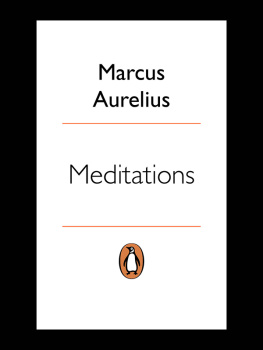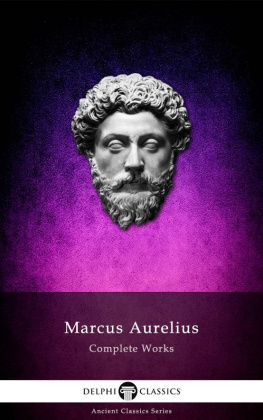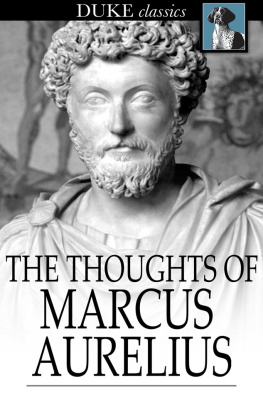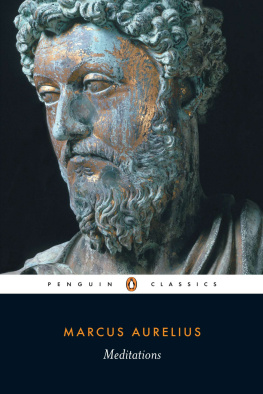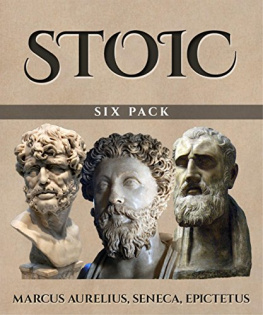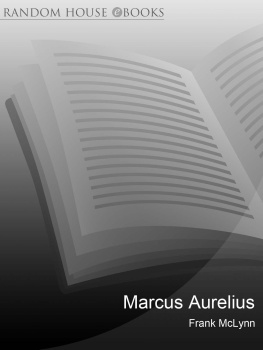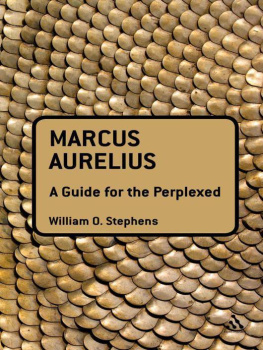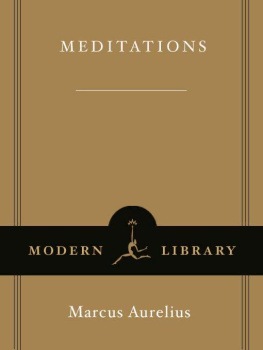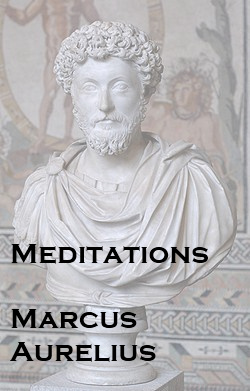Marcus Aurelius - Meditations (Penguin Classics)
Here you can read online Marcus Aurelius - Meditations (Penguin Classics) full text of the book (entire story) in english for free. Download pdf and epub, get meaning, cover and reviews about this ebook. year: 2006, publisher: Penguin Books Ltd, genre: Religion. Description of the work, (preface) as well as reviews are available. Best literature library LitArk.com created for fans of good reading and offers a wide selection of genres:
Romance novel
Science fiction
Adventure
Detective
Science
History
Home and family
Prose
Art
Politics
Computer
Non-fiction
Religion
Business
Children
Humor
Choose a favorite category and find really read worthwhile books. Enjoy immersion in the world of imagination, feel the emotions of the characters or learn something new for yourself, make an fascinating discovery.
- Book:Meditations (Penguin Classics)
- Author:
- Publisher:Penguin Books Ltd
- Genre:
- Year:2006
- Rating:3 / 5
- Favourites:Add to favourites
- Your mark:
- 60
- 1
- 2
- 3
- 4
- 5
Meditations (Penguin Classics): summary, description and annotation
We offer to read an annotation, description, summary or preface (depends on what the author of the book "Meditations (Penguin Classics)" wrote himself). If you haven't found the necessary information about the book — write in the comments, we will try to find it.
Meditations (Penguin Classics) — read online for free the complete book (whole text) full work
Below is the text of the book, divided by pages. System saving the place of the last page read, allows you to conveniently read the book "Meditations (Penguin Classics)" online for free, without having to search again every time where you left off. Put a bookmark, and you can go to the page where you finished reading at any time.
Font size:
Interval:
Bookmark:
 Marcus Aurelius
Marcus Aurelius MEDITATIONS
Translated with Notes by MARTIN HAMMOND
With an Introduction by DISKIN CLAY

Contents
PENGUIN  CLASSICS
CLASSICS
MEDITATIONS
MARCUS AURELIUS ANTONINUS was born in AD 121, in the reign of the emperor Hadrian. At first he was called Marcus Annius Verus, but his well-born father died young and he was adopted, first by his grandfather, who had him educated by a number of excellent tutors, and then, when he was sixteen, by Aurelius Antoninus, his uncle by marriage, who had been adopted as Hadrians heir, and had no surviving sons of his own. Aurelius Antoninus changed Marcus name to his own and betrothed him to his daughter, Faustina. She bore fourteen children, but none of the sons survived Marcus except the worthless Commodus, who eventually succeeded Marcus as emperor.
On the death of Antoninus in 161, Marcus made Lucius Verus, another adopted son of his uncle, his colleague in government. There were thus two emperors ruling jointly for the first time in Roman history. The Empire then entered a period troubled by natural disasters, famine, plague and floods, and by invasions of barbarians. In , one year before the death of Verus left him in sole command, Marcus went to join his legions on the Danube. Apart from a brief visit to Asia to crush the revolt of Avidius Cassius, whose followers he treated with clemency, Marcus stayed in the Danube region and consoled his somewhat melancholy life there by writing a series of reflections which he called simply To Himself . These are now known as his Meditations , and they reveal a mind of great humanity and natural humility, formed in the Stoic tradition, which has long been admired in the Christian world. He died, of an infectious disease, perhaps, in camp on 17 March AD 180.
MARTIN HAMMOND was born in 1944 and educated at Winchester College and Balliol College, Oxford. He graduated in Literae Humaniores in 1966, and since leaving Oxford has taught in England and in Greece. He was Head of Classics at Eton College for six years from 1974, and subsequently Master in College. In 1984 he was appointed Headmaster of City of London School, and thereafter was Headmaster of Tonbridge School for fifteen years from 1990. He is married, with two children. He has also translated The Iliad (Penguin, 1987) and The Odyssey (2000), and is now working on a translation of Thucydides.
DISKIN CLAY is Professor of Classical Studies at Duke University. His BA degree is from Reed College, in Portland, Oregon (1960), and his PhD from the University of Washington in Seattle (1967). He has taught at Reed College, Haverford College, The Johns Hopkins University, The City University of New York, and in France, Greece and Italy. His main publications have been in the field of ancient Greek philosophy. His Lucretius and Epicurus appeared in 1983; Paradosis and Survival: Three Chapters in the History of Epicurean Philosophy in 1998; Four Island Utopias (with Andrea Purvis) in 1999; and Platonic Questions: Dialogues with the Silent Philosopher in 2000. His study of Archilochos Heros: The Cult of Poets in the Greek States appeared in 2004. He is now working on two studies of Dante and his influence: Dantes Parnassus: The Pagan Poetry of the Commedia and The Art of Hell .
Preface
The writings of Marcus Aurelius, conventionally known as the Meditations , are unique in Classical literature the personal and philosophical diary written in Greek by an intellectual Roman emperor without any thought or intention of publication and remain of unique interest and relevance to the modern world. To Himself is the better title given in the manuscript used for the first printed edition in 1559 (this manuscript is now lost: there is only one other complete manuscript): but neither this title nor the convenient division into Books and chapters has any authenticity. Marcus wrote for himself, probably without title and certainly without planned overall structure: and he wrote in Greek because in the second century AD Greek was still the language of philosophy, read, written, and spoken with facility by most educated Romans. Marcus Greek lively, taut, spare, sometimes crabbed is both a joy and a challenge to the translator.
In a striking passage Matthew Arnold described Marcus Aurelius as perhaps the most beautiful figure in history. He is one of those consoling and hope-inspiring marks, which stand for ever to remind our weak and easily discouraged race how high human goodness and perseverance have once been carried and may be carried again ( Essays in Criticism: First Series [London, 1865]). Though Marcus himself would have rejected the extravagance of this praise, there is some truth in Arnolds rhetoric: truth likewise in G. M. A. Grubes more recent characterization of the Meditations as a strange, noble, and sad book ( Marcus Aurelius: The Meditations [Indianapolis, 1983]). What is certainly true is that the range, diversity, and honesty of Marcus reflections on human life and death in the perspective of eternity doubt and despair, conviction and exaltation all equally intense have enduring power to challenge, encourage, or console. And there is the constant interest of the personal preoccupations, problems, and prejudices which give sharp life to Marcus writing. All this is informed by a passionate moral commitment, the philosophical conviction of the unity of all things, and a firm belief in the interfusion of the human and the divine (The gods are with us and share our lives [6.44]; every mans mind is god [12.26]).
For this translation I have used, with only a few minor variations, the text in A. S. L. Farquharsons two-volume edition (Oxford, 1944). I have also followed Farquharsons division of chapters into sub-sections, except in 6.16, 6.30, and 11.18. The sub-sections are marked in the text of the translation by marginal numbers in italics.
Readers may wish to use the notes selectively, consecutively, or of course not at all (much of Marcus is immediately accessible without need of annotation). The notes are intended to give detail and/or explanation where that might be helpful, and to provide a road map for the Meditations , so that at and from any point the reader may find either discussion or directions to discussion elsewhere: hence the welter of cross-references in the notes, and a number of synoptic notes gathering together the dispersed range of Marcus thoughts on a particular topic (e.g. Marcus on the gods, note on 6.44).
I have many debts of gratitude. To the Governors of Tonbridge School for granting me a sabbatical term in Michaelmas 2002, which accelerated what would otherwise have been the glacial pace of progress in the writing of this book; to Peter Carson and Lindeth Vasey of Penguin for encouragement, help, and guidance; to Anna Rogers for her wonderfully calm and efficient management of the conversion of my unevenly legible manuscript to printers copy; to Professor Tony Long for much detailed help and advice; to Andrew Crawshaw for giving us the use of his delightful house on the island of Andros, where much of this book was written.
Above all, I am very grateful to Professor Diskin Clay of Duke University for kindly agreeing to write the Introduction to this book: he has also provided the suggestions for further reading.
Martin Hammond
Introduction
Meditating on the Meditations
In his Meditations , Marcus Aurelius Antoninus describes himself as a male, mature in years, a statesman, a Roman, a ruler.
Marcus father died when he was a boy and he was brought up in the home of his paternal grandfather, named, like his son and grandson, Marcus Annius Verus. The emperor Hadrian (ruled AD 11738) came to know and admire Marcus when he was a young man of seventeen and liked to call him verissimus (most true and truthful), after his cognomen Verus (true). Marcus names and titles ( nomina ) are an omen of his career as an emperor and a philosopher. His cognomen translates into Greek as alethes , and truthfulness, realism, and honesty, as we will see, were the virtues Marcus admired most. In February of AD 138, just months before his death, Hadrian adopted the man who was to become Marcus adoptive father, Titus Aurelius Antoninus. In turn, Antoninus adopted Marcus that same year. Marcus Annius Verus then took the name and title Marcus Aurelius Antoninus. Antoninus Pius, as he came to be called, ruled from 138 until his death in 161, when Marcus became emperor in his turn.
Next pageFont size:
Interval:
Bookmark:
Similar books «Meditations (Penguin Classics)»
Look at similar books to Meditations (Penguin Classics). We have selected literature similar in name and meaning in the hope of providing readers with more options to find new, interesting, not yet read works.
Discussion, reviews of the book Meditations (Penguin Classics) and just readers' own opinions. Leave your comments, write what you think about the work, its meaning or the main characters. Specify what exactly you liked and what you didn't like, and why you think so.

